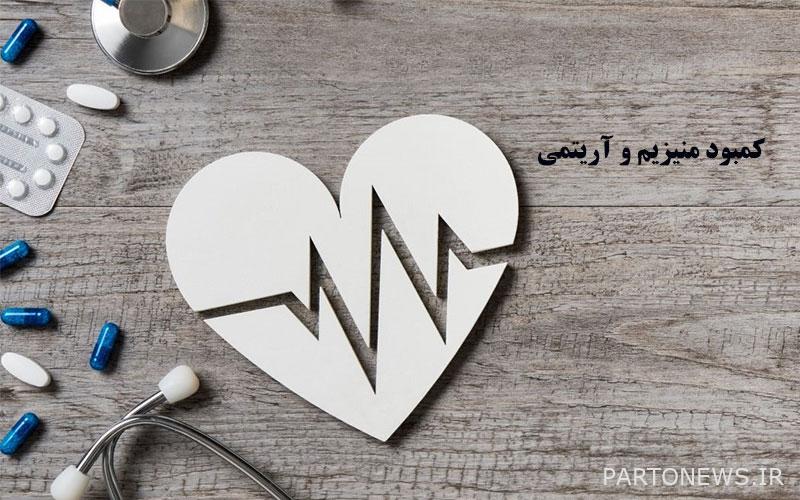Signs and symptoms of magnesium deficiency in the body

Magnesium is one of the most essential minerals for the body, which after calcium plays the most important role in maintaining healthy bones. Muscle cramps and mental health disorders are often caused by a lack of magnesium in the body. This mineral is involved in more than 300 biochemical reactions in the body and is effective in various aspects of health. In this article, we will introduce you to the symptoms of magnesium deficiency in the human body to increase the food sources of this element in your diet and, if necessary, use magnesium capsules to compensate for this deficiency.
What we read in this article
Why do we need magnesium?
Since magnesium is involved in many body processes, including the following, it must be consumed daily:
- energy production
- Bone and tooth structure
- Muscle function
- Nervous system response and function
- DNA replication
- RNA and protein synthesis
Therefore, it is necessary for all people to use magnesium food sources in their diet on a daily basis.
Causes of magnesium deficiency in the body
Symptoms of magnesium deficiency are not uncommon because it is rare for a person to get it. But some factors increase the risk of magnesium deficiency, including the following:
- A diet that contains small amounts of magnesium
- Having digestive disorders such as Crohn’s disease or celiac disease
- Loss of excessive amounts of magnesium through urine and sweat due to genetic disorders or excessive alcohol consumption
- Being pregnant or breastfeeding
- being admitted to the hospital
- Having parathyroid disorders and Hyperaldosteronism
- Having type 2 diabetes
- Being old
- Use of some medications such as proton pump inhibitors, diuretics, bisphosphonates, and antibiotics
- Long-term magnesium deficiency may have adverse effects on bone density, brain function, nerve and muscle function, and the gastrointestinal tract.
In children and young people, magnesium deficiency may prevent proper bone growth, and in the elderly, it may increase the risk of osteoporosis and bone fractures.
What are the symptoms of magnesium deficiency?
If you experience the following symptoms, you may be deficient in magnesium. However, it is best to consult a doctor first before taking any action:
Muscle cramps and contractions
If you constantly feel cramps during activity or even rest, it is not at all unlikely that you are magnesium deficient. Did you know that magnesium deficiency can even lead to seizures if it is severe? Experts believe that these symptoms are caused by more calcium flowing to nerve cells, which in turn stimulates the nerves and muscles.
Note, however, that not all muscle contractions occur as a result of magnesium deficiency. For example, stress and excessive caffeine consumption can also cause muscle cramps. In some cases, the side effects of some medications and diseases that affect the nerves are also effective in occasional muscle contractions.

Osteoporosis and magnesium deficiency
Another symptom of magnesium deficiency is osteoporosis. There are several factors that increase the risk of osteoporosis, including:
- age increasing
- Inactivity and lack of exercise
- Inadequate intake of calcium and vitamins D and K in the diet
Magnesium deficiency also has a direct effect on bone loss. Studies in laboratory mice show that reducing magnesium in the diet will lead to reduced bone mass.
Depression and mental health disorders
Related Posts
Mental health disorders are another possible consequence of magnesium deficiency in the body. In this case, emotional numbness is seen in the person. Magnesium deficiency may even lead to coma if it becomes severe. Research shows that low magnesium levels are also associated with depression and increased anxiety. Magnesium supplements may improve neurological dysfunction and be successful in controlling anxiety and depression.
Fatigue and muscle weakness
Other symptoms of magnesium deficiency include fatigue or physical and mental weakness. Note that everyone gets tired after a while of activity, and this is perfectly normal. But here we are talking about fatigue being unusual and very intense. Muscle weakness is also more likely to be due to magnesium deficiency if it is accompanied by fatigue.
The relationship between high blood pressure and magnesium
Studies show that magnesium deficiency increases the risk of high blood pressure. As you probably know, high blood pressure will increase the risk of heart attacks in the body. Evidence suggests that taking magnesium pills may be effective in lowering blood pressure. Of course, more studies are needed in this area.
Irregular heartbeat
Heart arrhythmia or irregular heartbeat is one of the most important symptoms of magnesium deficiency in the body. Unfortunately, cardiac arrhythmias often have no specific symptoms and cannot be diagnosed. Of course, some people also complain of palpitations if they have this complication. Lightheadedness, shortness of breath, chest pain and fainting are other symptoms of arrhythmia. An arrhythmia can lead to a heart attack if it is severe. Scientists believe that an imbalance of potassium levels inside and outside the heart muscle cells may be the cause of this complication, which is also associated with low magnesium levels.
 Ala
Ala
Asthma and magnesium deficiency
It has been found in many cases that people with severe asthma are deficient in magnesium. Researchers believe that magnesium deficiency may cause calcium to build up in the muscles lining the airways of the lungs, making it difficult to breathe as the airway contracts. In some cases, people with severe asthma are given an inhalation spray containing magnesium sulfate to help them breathe better. Further studies are needed to link magnesium deficiency to asthma.
Complications of long-term magnesium deficiency
If magnesium levels in the body remain low for a long time and are not treated, the risk of developing chronic diseases such as:
- Heart disease
- High blood pressure
- Type 2 diabetes
- Osteoporosis
Will be more. If you feel the symptoms of magnesium deficiency, be sure to see a doctor to avoid chronic diseases.
Food sources contain magnesium
The best way to supply your body with magnesium is to eat magnesium-rich foods. The richest foods containing this mineral include the following:
- Nuts (especially almonds, cashews and peanuts)
- اسفناج
- Black beans
- peanut butter
- Whole wheat bread
- Avocado
- potato
- Rice
- yogurt
- Enriched cereals
Table of recommended daily intake of magnesium
By reading this table, you will find out how much magnesium you need daily:
| Age | Recommended daily amount For men and women (milligram) | Recommended amount during pregnancy | Recommended amount during breastfeeding |
| From birth to 6 months | 30 | ||
| 7 to 12 months | 75 | ||
| 1 to 3 years old | 80 | ||
| 4 to 8 years old | 130 | ||
| 9 to 13 years old | 240 | ||
| 14 to 18 years old | Boys: 410 Girls: 360 | 400 | 360 |
| 19 to 30 years old | Men: 400 Women: 310 | 350 | 310 |
| 31 to 50 years old | Gentlemen: 420 Women: 320 | 360 | 320 |
| 51 years and older | Men: 420 Ladies: 320 |
Concluding remarks
In this article, we have introduced the symptoms of magnesium deficiency. Magnesium is present in many foods and therefore its deficiency is rare. But if you feel double fatigue, muscle cramps and other symptoms that we mentioned, consult a doctor; You may need to use magnesium tablets.
Please rate this article
[مجموع: ۱ میانگین: ۵]


